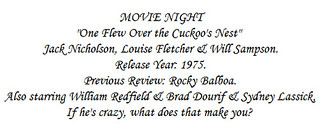
Review #1164: One Flew Over the Cuckoo's Nest.
Cast:
Jack Nicholson (Randle McMurphy), Louise Fletcher (Nurse Ratched), Will Sampson ("Chief" Bromden), William Redfield (Dale Harding), Brad Dourif (Billy Bibbit), Sydney Lassick (Charlie Cheswick), Christopher Lloyd (Max Taber), Danny DeVito (Martini), Dean Brooks (Dr. John Spivey), William Duell (Jim Sefelt), Vincent Schiavelli (Bruce Frederickson), Michael Berryman (Ellis), Nathan George (Attendant Washington), Marya Small (Candy), and Scatman Crothers (Orderly Turkle) Directed by Miloš Forman.
Review:
One Flew Over the Cuckoo's Nest was originally a novel by Ken Kesey that he had done based off his time working as an orderly in a mental healthy facility, for which he wrote the novel in 1959 before it was published in 1962. In the original novel, the story was narrated through the character named Chief Bromden, who found that society was controlled by some sort of system called "The Combine". A year after the novel was released, the novel was turned into a play, written by Dale Wasserman that had McMurphy played by Kirk Douglas, who had bought the rights to make it for the stage or for film. After a decade of trying to make it into a film, he gave the rights to his son Michael, who helped co-produce the film along with Saul Zaentz, with Lawrence Hauben and Bo Goldman doing the screenplay. The film was primarily filmed at Oregon State Hospital in Salem. Kesey was not happy with how the film adaptation came out, later suing Douglas and Zaentz for a percentage of the gross and damages for “breaking our verbal agreement and ruining the book.” He objected to the fact that the film was from the perspective of McMurphy rather than the Chief, describing it as such: "they took out the morality; they took out the Combine—the conspiracy that is America.”
At any rate, it isn't hard to see why the film is fairly enjoyable, having a certain kind of energy and pull with a fine deal of craftsmanship and interesting people to follow along with. Nicholson and his rebellious presence give a great magnetic pull for the film, bemused at having to deal with the state of the people on both sides of this mental institution that he deals with, while also having a bit of humor and will to him that makes for good entertainment. Fletcher plays her insidious role with a good degree of understated manipulation, having no sense of overblown nature nor being overshadowed by the other members of the cast, having a voice and enough presence to make this battle of wills work without too many hitches. One good scene with Nicholson and Fletcher that I can highlight is the scene where his character tries to get the television to be turned onto the World Series, where he tries to get the necessary amount of votes from the submissive ones in the ward and her attempts to assert her authority, complete with an ensuing (and amusing) act of defiance - imagining the game out loud. Sampson, who had been discovered by the producers due to his 6'7 frame, does a fine job for his acting debut, doing just alright with the small amount of lines he has while playing his part in the climax without any hitches. Dourif and Lloyd (who both had done work on the stage prior to this film) shine in their own ways, with the former's fear and willingness to try and please everyone coming out fairly well and the latter being amusing when picking on Redfield. Lassick does well with conveying panic and nervousness, and DeVito (reprising his role from the 1971 revival of the play) also does fine with brief moments to talk.
The film does take some time to show the conformity and mindless automation of the people in the ward, and for the most part the film keeps itself consistent. The fishing sequence is a bit of a miss when compared to other sequences in part because it just feels a bit too silly that kind of messes with the rest of the film's tone. It should be mentioned that the fishing sequence was present in the novel, although it has a few significant differences - such as the fact that the trip is planned in the book, for example. In any case, it's a bit of a understatement to say that the film turned out to be such a great success, being a hit with audiences while winning numerous awards, winning what is described as the Big Five categories of the Academy Awards: Best Picture (beating films such as Jaws and Nashville), Best Director, Best Actor, Best Actress, and Best Adapted Screenplay. On the whole, the film is pretty entertaining, having an enduring spirit to it that makes it work more often than not in its 133 minute run-time. It still manages to hold up well after over forty years since its release with a game cast and an enduring spirit that makes for at least one watch.
Overall, I give it 9 out of 10 stars.

No comments:
Post a Comment